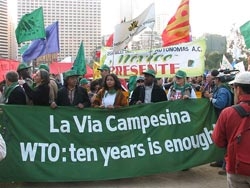[Interview] Xose Ramon, representative of Via Campesina for the International Peasant’s Struggle Day
[Interview] Xose Ramon, representative of Via Campesina for the International Peasant’s Struggle Day
Paola Tejada17 april 2007 – 17:48
Today is the International Peasant’s Struggle Day, an event created to commemorate the death of 19 landless peasants belonging to the Landless Movement (MST). They were massacred in Brazil on the 17th of April ,1996, during the second conference of la Via Campesina in Tlaxcala, Mexico.
For this occasion, we interviewed a representative of the Via Campesina organization, Xose Ramon.

Can you tell us what Via Campesina is exactly?
Via Campesina is an international movement that coordinates different locally based farmer organizations in various territories or states in Europe, Asia, Africa and America. These organizations coordinate their activities in the regions themselves to get the work done. We are against institutions like the FMI, the WTO, the world bank and those who have clearly negative impacts on the farmers and their lands.
Via campesina does not support the WTO and is not worried by the fact that it is in crisis. Why is that?
It is because all the WTO does is liberalize the agricultural market, by first of all, delocalizing. Second of all, it industrializes and causes individual farmers to disappear and be replaced by bigger companies. The third reason is the privatization of all the land’s resources; we think that such things as the land, water and seeds should be common human patrimony. Also, there is the right to food which should define every population (consumers and producers included), they should be able to eat the way they want to eat. It shouldn’t be the four biggest multinationals deciding for them.
We want to make an impact here in Europe because often people think that it isn’t concerned by all these problems, but all over Europe agricultural zones are disappearing. People are moving to the coasts and vast areas of land are now empty and exposed to dangers, like fires. If there isn’t an adapted management found for these lands, the effects on the environment are going to be disastrous.
But since the WTO has been in crisis, many countries have been directly making bilateral or national accords that have sometimes weakened farmers even more. Isn’t this worse?
Our work is against that type of liberalization. We think that food should have a fresh base and grow in a living, healthy, rural land, that’s why the peasant’s have to stay and not give in to delocalization. We aren’t just against the WTO, but all the accords that have negative effects on agriculture. It’s easier to react and mobilize where there are stronger concentrations of farmers. By coming together we’ve been able to stop some accords from taking place, especially those of the WTO.
What alternative policy does Via Campesina propose?
We propose an alternative based on trust, on the help of organizations like the United Nations, and on each population’s right to food and to define it’s own nourishment and agricultural policy. Then there is also the “dumping” phenomenon that we do not support: not just where the products are dumped, but also the country that produces them. We think we could cooperate with them and make common accords for exchanges between what exceeds in one country and what lacks in another. The excess of products should not be used to conquer the markets. Food shouldn’t be a topic that leads to fighting, but to cooperation between states.
Via Campesina has also mentioned “food sovereignty” as an alternative. Could you please define this term?
Food sovereignty is the right of each population, each state or each group of states to be able to debate and define democratically what type of production and what type of food it wants to make and not for it to be imposed upon them by exterior powers. This means that we think that such things as seeds, land and water should be treated as common human patrimony. A small number of people shouldn’t be deciding who gets food and who doesn’t.
We think that the European Union’s PAC (Politique Agricole Commune) and other global accords of this nature are a great problem for the agricultural world. They try to impose their policies on developing countries to dominate them and exploit their resources. We think that we would have to change them for this common political policy. This policy would produce, primarily for Europe, a balance of production hand in hand with a method of agricultural exploitation that respects the environment. This also includes an adequate control of the prices and the production to not interfere in the development of foods in other countries, as well as a guarantee of food for everyone.
Nieuwslijnmeer

- Indymedia.be is niet meer
- Foto Actie holebi's - Mechelen, 27 februari
- Lawaaidemo aan De Refuge te Brugge
- Recht op Gezondheid voor Mensen in Armoede
- Carrefour: ‘Vechten voor onze job en geen dop!’
- Afscheid van Indymedia.be in de Vooruit in Gent en lancering nieuw medium: het wordt.. DeWereldMorgen.be
- Reeks kraakpanden in Ledeberg met groot machtsvertoon ontruimd
- Forum 2020 en de mobiliteitsknoop
- Vlaamse regering kan niet om voorstel Forum 2020 heen (fietsen)
- Fotoreportage Ster - Studenten tegen racisme

















